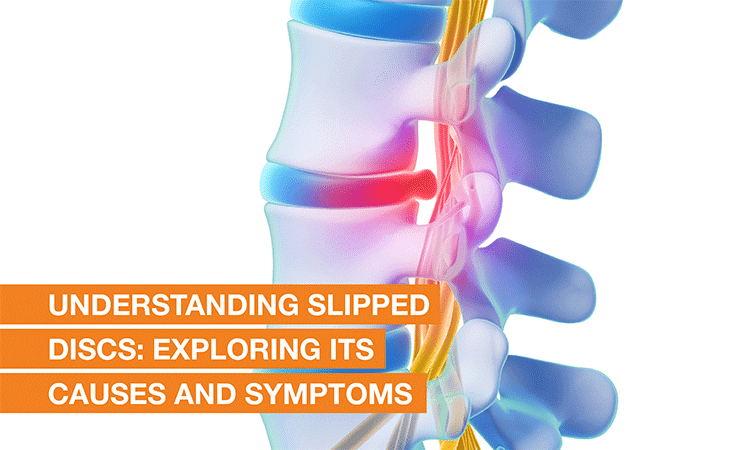Request Appointment
Enter your details and we will be in touch with you shortly;
Or call
8655885566
between 8 am and 8 pm.


Slipped disc symptoms usually begin with persistent back pain, stiffness, or pain that radiates to the legs, arms, or hips depending on the affected spinal level. Also known as disc herniation, this condition occurs when the soft inner portion of a spinal disc pushes out and irritates nearby nerves. Early signs may include numbness, tingling, muscle weakness, or difficulty in movement, making timely diagnosis and treatment essential to prevent long-term spine complications.
The spine is a complex structure consisting of vertebrae separated by intervertebral discs. These discs act as shock absorbers, cushioning the spine and allowing flexibility in movement. A slipped disc occurs when one of these discs sustains damage or starts bulging, exerting pressure on nearby nerves and causing pain.
Several factors can lead to the development of slipped discs. Some of which are as follows.
Degeneration:
As we age, the discs lose water content, becoming less supple and more prone to wear and tear.
Injury and Trauma:
Sudden impact or repeated injuries to the spine can damage the discs, leading to herniation.
Poor Posture:
Maintaining improper posture for extended periods can strain the spine, contributing to disc problems.
Sedentary Lifestyle:
Lack of physical activity and prolonged sitting can weaken the back muscles and increase the risk of disc herniation.
Smoking:
Smoking can negatively affect blood flow to the discs, hindering their ability to repair and heal.
Excess Body Weight:
Being overweight places extra stress on the spine, increasing the likelihood of disc problems.
Lifting Heavy Objects:
Incorrect lifting techniques, especially when handling heavy objects, can strain the back and increase the risk of herniated discs.
Genetics:
Some individuals may have a genetic predisposition to disc degeneration, making them more susceptible to slipped discs.
The symptoms of a slipped disc can vary depending on its location and severity. Common signs of a slipped disc symptoms include:
Persistent or shooting pain in the lower back, neck, or upper back, which may worsen with movement or certain positions.
Nerves affected by the slipped disc can cause sensations of numbness, tingling, or weakness in the arms or legs indicating nerve compression.
Weakening of the muscles in the affected area, leading to difficulties in performing specific tasks.
A slipped disc can compress nerves, causing pain to radiate down the arms or legs. This is known as sciatica causing tingling, and numbness.
Reflexes may be diminished or altered due to nerve involvement.
If you experience persistent back pain or suspect a slipped disc, it is essential to seek medical attention promptly. An accurate diagnosis and timely treatment are crucial in managing the condition effectively. Here are some treatment methods to ease pain from slipped discs.
Conservative Measures:
Rest, hot or cold compresses, and over-the-counter pain relievers may provide relief for mild cases.
Physical Therapy:
Targeted movements and stretches can help strengthen the back and improve flexibility.
Medications:
In some instances, doctors may prescribe medications to manage pain and inflammation.
Surgery:
While most cases can be managed non-surgically, severe or persistent cases may require surgical intervention.
Taking proactive steps to prevent disc herniation is essential. While not all slipped discs can be prevented, adopting a few lifestyle changes can minimize the risk.
Maintain Good Posture
Practice proper posture when sitting, standing, and lifting objects.
Exercise Regularly
Engage in activities that strengthen the core and back muscles.
Lift with Care
Use proper lifting techniques, bending the knees and keeping the back straight.
Maintain a Healthy Weight :
Excess weight can strain the spine, so ensure you maintain a healthy weight by incorporating healthy eating habits.
Stay Active:
Regular physical activity and workout strengthens the back muscles and helps maintain spine health.
Quit Smoking:
Quitting smoking can improve disc health and overall well-being.
Understanding the causes and symptoms of slipped discs empowers individuals to take charge of their spinal health. By adopting preventive measures and seeking timely medical attention, we can work towards mitigating the impact of slipped discs and lead a life free from back pain and discomfort. Always consult with a healthcare professional for proper evaluation and personalized treatment options. Remember, a healthy spine is the key to a fulfilling and active lifestyle.
Call 086558 85566 to book your first free consultation with a spine specialist at QI Spine today.
Visit our nearest clinic for your first consultation